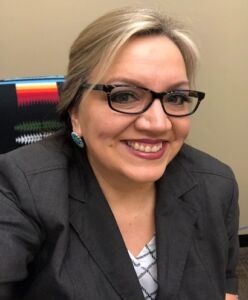Congratulations to This Year’s Rising Star! – Julie Jefferson
 Julie Jefferson
Julie Jefferson
Communications Director
Lummi Indian Business Council
Julie Jefferson exemplifies a student that has overcome many obstacles and demonstrated great
determination in pursuit of her higher education degrees. With three grown children and five grandchildren, Julie applied to enter our University of Washington graduate degree program in the fall of 2019. Julie was only through half of her first year in the University of Washington Master of Infrastructure Planning and Management degree when the largest pandemic in our lifetime hit the world early this year.
Julie in her role as the Communications Director for the Lummi Business Council is in a crucial position to ensure that members of her community receive the public information updates needed to keep them safe from covid-19 exposure. Her responsibilities as Communications Director for the Lummi Indian Business Council means that she is responsible for communications sent to the tribal council, the general council (enrolled tribal membership), the community, and the press.
The Lummi Nation, as a self-governing tribe, is the third-largest tribe in Washington State with over 5,300 community members covering 13,500 acres of uplands and 10,500 acres of tidelands with a perimeter of close to 27 miles. Native American communities are some of the hardest-hit communities in terms of fatalities across the US so getting public health safety communications right with daily changing guidance from local, state, and federal health authorities is no small challenge. In the midst of all of this, Julie has continued to pursue her graduate degree and is scheduled to graduate on track from our graduate program in August 2020.
“She has recently been chosen to represent our program in the UW College of Built Environments newly formed Student Advisory Group. We feel fortunate to have Julie as a strong leader and advocate for the emergency management community enrolled in our program.” – Wendy Freitag, Academic Services Director, University of Washington Department of Urban Design and Planning
What drew you to the emergency management and community field of study?
Julie Jefferson: I feel that a couple of things have brought me to my path. My current position is the Communications Director for the Lummi Tribe and in the position, I work with the emergency management team, along with the emergency preparedness team to prepare for winter storms. I also work with the teams to prepare for disasters. In that work, I have seen and not seen enough work being done. I feel that there is so much more to be done and I have had the opportunity in my position to bring in more emergency preparedness and go out to seek different training opportunities on my own. I look at my community, we are a nation within a nation, and being able to provide for our people. Our community is very reliant on our government to make sure that we are protected.
What do you think are the key leadership skills that are important for you and others to bring to communities?
Julie Jefferson: In my community, directly, one of the big things is being able to talk to people and sharing the information in a way that they understand. Continuous updates. Continuous drills. Continuous training opportunities. The thought of preparedness and the thought of management needs to be at the forefront to show its importance and I think being able to bring that to the community and speak to them in a way that allows one to come in to bring that information. It is definitely a lot about relationships. The biggest piece is the relationships with the community but another big piece, especially in our area, is the local, state, and federal partners. Those relationships are still being built here in Lummi. There has been growth over the last several years but there is a lot more to go when it comes to making sure that in an event of an emergency, that we have those working relationships. We want them to know whom they are talking to and that they know us to help better understand the needs of the community.
At a young, age I had the opportunity to volunteer for Disaster Relief following a Category IV Hurricane on the Gulf Coast. Since then I moved to the Pacific Northwest and have had opportunities to work with the Safe Streets program while attending Western Washington University. While a student at Western Washington University (WWU) in a Political Science course each student had a community project assignment to complete. I chose to use this opportunity to bring awareness to the dangers for pedestrians on a main road on the Lummi Reservation, showing the loss of lives, the risks, and the need to address safety for pedestrians and vehicles. I have worked in positions that have allowed me direct contact with the community and surrounding communities to hear and understand their needs and concerns.
Most recently I have served as the Communications Director responsible for several communications including emergency preparedness and COVID-19 news, updates, and safety protocols. As the communications director, I serve as a team member on the Emergency Preparedness team and Emergency Management team. I have attended an array of training prospects and completed certifications related to Emergency Management, Emergency Preparedness, CERT training, CERT Trainer, and HAM Radio Technician License to better serve the community in the event of a Natural Disaster. In this capacity, I have observed the need for continued work on better preparing the community in the event of a larger crisis, hazard/event, and protecting our families, neighbors, and all within our greater community. My experiences, passion, concern for others and our future led me to enroll in the University of Washington’s Master of Infrastructure Planning and Management degree to gain experience and build upon my knowledge to continue to serve rural and urban communities. My expected graduation date is approaching, and I look forward to furthering opportunities to serve both my community and surrounding communities.

